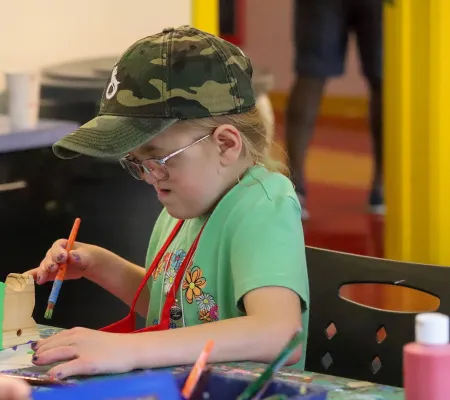Why do we need to celebrate developmental disabilities?

In March we honor Developmental Disabilities Awareness Month. This is a month where we learn about and celebrate those with developmental disabilities. What is a developmental disability? According to the Centers for Disease Control and Prevention, “developmental disabilities are a group of conditions due to an impairment in physical, learning, language, or behavior areas. These conditions begin during the developmental period, may impact day-to-day functioning, and usually last throughout a person’s lifetime.”
Why do we need to celebrate developmental disabilities? We have come so far in our understanding and treatment of people with disabilities. As a society, we have certainly come far in speaking out about mental health, developmental disabilities, and substance use. We still have so very far to go. Recently a couple of situations have made this clear to me. One situation included a family member. This family member, who was two years old, was “stimming” (repetitive motions that can help with handling feelings). Stimming can include hand flapping, using toys in ways other than they were meant to be used, and echolalia (repeating words spoken by another). Although not a licensed clinician, my experience gave me reason to be concerned and encouraged the family to consider testing for Autism. As a person who has worked in this field for almost two decades, I was trying to provide some help and support. Unfortunately, I was met with defensiveness and denial. The family did not want to acknowledge that this family member was living with Autism. It took over a decade before that person was acknowledged for who they are. I mourn the loss of possibility and support for that family by delaying treatment and support. As a side note, they are doing great! I love to talk with them as they always have a fresh perspective and keep me laughing.
In another situation more recently, I was talking to my daughter about her day at school. I have tried to share with both of my children about people with developmental disabilities to normalize disability and create an environment for inclusion. My teenage daughter was able to recognize immediately when another student was living with a developmental disability and engaging in echolalia. However, the student was kicked out of the class by the teacher as they were “disrupting” their classroom.
With these situations and countless more, I say we have more work to do as a community here and across the world. We can all do something to support those with developmental disabilities. Here are a few things that can help celebrate developmental disabilities now and throughout the year.
1 - See me, not the disability!
People with developmental disabilities are just that, people. Talk to them, walk with them, work with them, and play with them. For me, that means making sure that all kids in my son’s classroom will be invited to his birthday party. An inclusive environment is important for kids and adults with developmental disabilities. It allows them to opportunity to interact and learn from their peers. It is also important for kids without disabilities to understand what a disability is and how to encourage inclusion early on so that it can last the lifetime.
2- We ARE a community.
As the old saying goes, it takes a village to raise a child. Families with children and adults with disabilities are no different; they need a village supporting them and cheering them on. This month, I plan to come alongside the family at church who has a child with a disability to say “Hello.” I hope to get to know them and encourage them where possible. Consider what you can do this month to support those with developmental disabilities to be a part of our community. You can consider hiring a person with a disability or inviting a person with a developmental disability to a community function.
3 - Don’t judge, educate.
It can be the easy path to judge those who say or do the wrong things when it comes to people with development disabilities. However, I would challenge you to restrain the initial judgements and try to educate people about developmental disabilities. Understanding others and helping them to understand others will bridge the gaps for those who are unaware of how their words and actions affect those with developmental disabilities. Today, I will also challenge myself not to judge my family or my daughter’s teacher. Instead, I will talk to them to understand why they act and feel as they do. I will also try to educate by sharing a little information about developmental disabilities and how we can support people with developmental disabilities.
Today, I challenge you. What is it that you have been thinking about doing for someone with developmental disabilities? Can you reach out to a family with a child with Cerebral Palsy to just listen and talk? Would you be able to include that person in your community with disability to your next event? What can you do in your role to help support the developmental disability community? We are just people who need people. Go find your people.
--Megan Roberson, Director of Trillium Connections and Policy